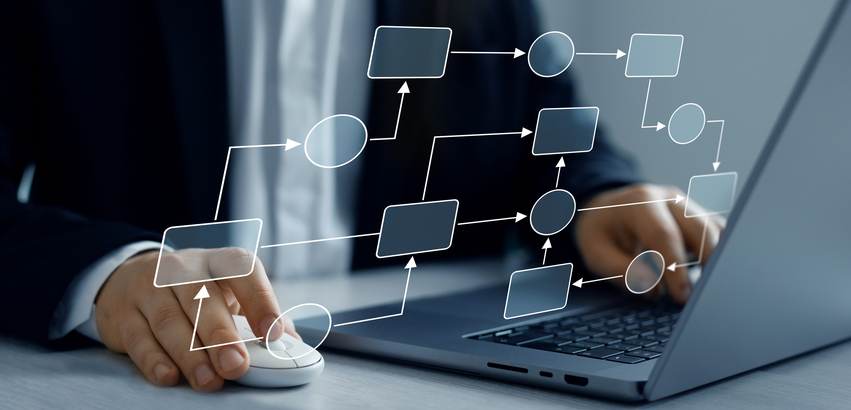The food and beverage industry is rapidly evolving, and keeping your business competitive with increasing consumer demands means adopting the latest technologies. One of these transformative tools is Enterprise Resource Planning (ERP) software.
ERP solutions allow you to optimize your production processes, enhance your inventory management, ensure compliance with regulations, and enable you to distribute more efficiently. In this post, we’ll explore the benefits of implementing ERP in the food and beverage industry.
What Is an ERP System?
ERP is a software solution that integrates discrete business functions into one unified system and process. Having an ERP system in place allows organizations to make informed business decisions, streamline essential processes, and increase operational efficiency.
With ERP systems, businesses have access to a centralized platform to manage their inventory, supply chain, finances, production, sales, and customer relationship management (CRM). This seamless, consolidated platform empowers you to reduce manual tasks through process optimization, which boosts your overall productivity.
How Does It Work?
An ERP is the central hub for every critical business process, facilitating accurate data and consistency. It works by collecting and organizing key business information and providing actionable insights for better decision-making. By streamlining processes and workflows, you are rewarded with improved organizational efficiency and reduced costs.
ERPs also allow departments to share information and collaborate in real-time. This support ensures every team utilizes the same data and is working towards a common goal.

Digital Transformation for Food Manufacturing
Download this guide to discover what’s involved in laying the groundwork for a successful digital transformation, from evaluating your current readiness to implementing smart technologies.
Challenges Facing the Food and Beverage Manufacturing Industry
To fully understand the benefits of ERP software, you must first understand a few global trends that are disrupting the industry. These challenges include:
Rise of Healthier Alternatives
Over the years, global consumers have started to shift toward plant-based and sustainable dietary options. These changes in preferences are influenced by rising awareness about health issues, animal welfare, and eco-friendliness.
Additionally, veganism and vegetarianism are on the rise, which is driving demand towards innovative and delicious plant-based products. Food and beverage manufacturers must meet these new trends while maintaining the texture, quality, taste, and experience their customers have come to expect.
Transparency
When consumers make buying decisions, they are influenced by a product’s sourcing and ingredients list. Studies suggest that consumers prefer identifiable ingredients on short lists over unpronounceable ingredients on long lists. Customers also value ethically and environmentally sourced ingredients.
Being transparent about your supply chain is the key to satisfying today’s conscious buyers. Food and beverage manufacturing companies must embrace innovative and ethical product processing, sourcing, and manufacturing techniques. Being transparent about your practices proves your accountability to consumers who value sustainability, health, and reduced carbon emissions.
Additionally, your products must be traceable. Regulations require your food and beverage products to be labeled to ensure ingredients can be traced and tracked through the entire process, from sourcing to shipping to the final sale. Proper labeling allows the Food and Drug Administration (FDA) and other regulatory organizations to issue recalls and other safety information to consumers if needed.

Sustainability
At the heart of manufacturing is sustainability. Over the last few years, the food and beverage industry has started to focus on sustainable packaging, locally sourced products and raw materials, and safe recycling and waste management.
Consumer loyalty has moved towards brands that show they are serious about their sustainability efforts. There is now an opportunity to educate stakeholders about risk planning and end-to-end sustainability in the supply chain.
E-Commerce
Smartphone devices and the internet are everywhere, which has created a new pathway for food and beverage sales. Buying online is a new trend, with experts predicting e-commerce will only grow in popularity.
The rise of online platforms has provided consumers with more access to a wide range of products and services. Not only do they buy groceries online, but they also buy meal kits and order restaurant delivery. This transition places a greater emphasis on personalized customer experiences and tailored marketing to increase sales and strengthen relationships with consumers.
Automation
As a result of tighter supply chains and labor shortages, the food and beverage industry has begun to leverage automation in its manufacturing operations. Automation allows for improved quality control, better food safety, and increased end-to-end visibility. It also improves the supply chain, reduces overhead costs, and decreases the need for manual intervention.
Artificial Intelligence (AI) solutions have further revolutionized the industry. With machine learning (ML), this industry has unlocked capabilities like predictive maintenance, personalized recommendations, demand forecasting, and data-driven analysis.
Ready to start your digital transformation journey?
Benefits of ERP for the Food and Beverage Industry
In the food and beverage industry, where processes are complex, an ERP system helps you achieve real-time visibility. These operations often involve multiple stages, including production, distribution, and compliance, and ERP systems help you maintain control over every step.
ERP helps businesses overcome the unique challenges in food and beverage processing that are mentioned above while revolutionizing it in many beneficial ways. They include:
Inventory Management
The food and beverage industry deals with perishable goods. ERP systems make it easier to manage your supply chain and inventory control through detailed tracking. This tracking ensures you obtain raw materials on time and organize your inventory to reduce waste.
ERP systems can also aid with demand forecasting by analyzing the past to predict when items are in high or low demand. This proactive approach helps you adjust your supply accordingly to avoid overproduction or shortages.
Regulatory Compliance
In addition to product expiration, companies in the food business must handle strict regulatory requirements. ERP systems help your business maintain compliance by tracking and documenting all your processes to ensure they align with industry standards.
This minimizes your risk of penalties and allows you to adapt to evolving regulations. ERP software also allows for seamless reporting and auditing for greater accountability.
Quality Assurance
Food ERP software helps you monitor quality control processes to ensure you deliver safe and quality products. You can track batch production and ensure products meet industry safety standards. If there are quality issues, ERP systems offer traceability, so you can respond quickly and issue recalls if necessary.

Production Scheduling
Your customers expect your product to be consistent and of high quality. With ERP software, you can respond quickly to market demands with efficient production planning. By managing production lines, workforce scheduling, and maintenance planning, you can maintain consistent product quality. ERPs also integrate predictive maintenance, which reduces your downtime.
Decision-Making
ERP software provides access to real-time data, such as sales trends, supply chain statuses, customer feedback, and inventory levels. This information is key for strategic planning and allows you to make informed decisions quickly. With unprecedented access to information, you can be flexible and respond effectively to changing markets.
Cost and Waste Reduction
Utilizing ERP systems to streamline your operations and automate routine tasks helps you reduce overall operational costs. It also reduces manual errors and allows you to optimize your resource allocation. ERP software provides insights into costs, providing you with information about where you can reduce expenses.
Customer Relationship Management
ERPs integrate with CRM functionality. These systems provide key insights into customer preferences. By understanding consumer behavior, you can more effectively manage orders and improve customer service through personalized marketing. Ultimately, this leads to long-term customer relationships through improved customer experiences.
Propel Your Food and Beverage Company Forward with Ultra Consultants
If you’re in the food and beverage manufacturing industry, implementing an ERP system offers numerous advantages that give you a competitive edge. ERP software has become an indispensable tool for success in this ever-changing and competitive industry. The benefits it offers include a boost in profitability, compliance with industry standards, enhanced efficiency, improved inventory management, and more.
As an independent enterprise software consulting firm, Ultra Consultants can help your food and beverage business experience game-changing results for your bottom line. To learn more about our ERP consulting services in the food industry, request a free discovery call today.
Table of Contents
More ERP material...
Why Smart Factories Are No Longer Optional for Food Manufacturers
Discover why smart factories are essential in 2026 for food and beverage…
Top ERP Software Trends 2026: AI Capabilities to Watch
Learn why analyzing and improving processes upfront is critical to reducing risk,…
Why Do Business Process Analysis Before a New ERP System
Learn why analyzing and improving processes upfront is critical to reducing risk,…



